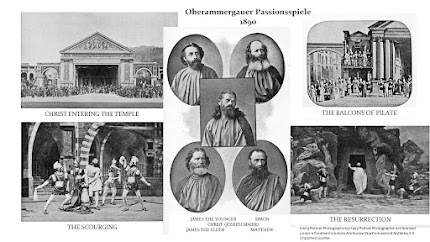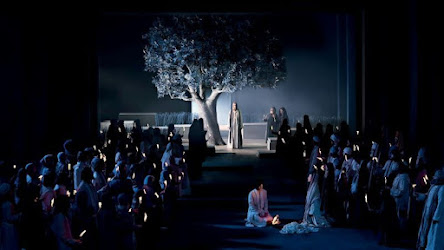By Kathy Kovach
Last month, I wrote about the artsy hamlet of Oberammergau in Bavaria, Germany, which included the Passion Play that has been performed every decade for the past 400 years, with only a few exceptions. In that article, I focused on the origin, which began as an oath in exchange for the Lord’s protection during a time of plague. Go to this LINK to learn more.
The
Passion of Christ, a depiction of our Savior’s suffering, death, and resurrection,
is too significant to gloss over. Therefore, I’d like to spend more time on the
play to which the German citizens have spent centuries dedicating their lives.
In
the early years, a wooden platform had been set up at the church in the
graveyard where the victims of the Bubonic Plague were buried. This is what
prompted the oath to dedicate the play to God and perform it every ten years if He would spare the rest of the
residents. Popularity grew, and by the mid-18th century, it was
moved to a nearby field to accommodate the growing number of visitors.
The first script in 1634 was based on 15th-century medieval manuscripts and later edited in 1664. There have been many edits and rewritten versions since then. At some point, it was decided to change the dates to those years ending in a zero. Thus, 1680 began those decadal years, culminating in what it is today with 2000 citizens involved . . . all local villagers . . . all ages and genders . . . from acting to set design. Can you imagine putting on a production like that for nearly four centuries?
 |
| The Passion Play 1890 |
Although
the early organizers had promised to put on the play every ten years, this
wasn’t always possible. Human intervention messed with the timeline a few
times, but in all, the oath was fulfilled to the best of their ability. Below are
some of the highlights of disruption, however, the play only had to be
canceled twice and postponed four times.
- 1770, canceled due to a ban by then Prince-elector
Maximillian III Joseph of the Holy Roman Empire who declared, "The theatre
stage is no place for the greatest secret of our holy religion."
- 1920, postponed until 1922 due to the German’s
WWI defeat and the political unrest that followed.
- 1940, canceled due to WWII.
- 2020, postponed until 2022 due to the
coronavirus pandemic.
Special
performances were granted in 1934 and 1984 to commemorate the 300th
and 350th anniversaries respectively.
Requirements for the production have changed little over the years. Only citizens of Oberammergau who have lived there twenty years or more are allowed to participate—men, women, and children—which utilizes a good chunk of the community. The male actors must begin growing their beards the year beforehand by Ash Wednesday. There have, on occasion, been challenges to the traditions. For example, prior to 1984, all participating women were to be under the age of 35, however, three women took their equality case to court and won. Interestingly, as of 1990, Mary the mother of Jesus was to be single, but this standard was broken with much controversy when a married mom was chosen for the first time solely because of her acting skills. Also, in the early, years only Catholics could participate. Eventually, Protestants were allowed. Then, as of 1990, Muslims are now included.
Over
the 4 centuries and 42 productions, the Passion Play itself has not only been
revered but, alas, bruised at times due to various human egos. As aforementioned, it was canceled due to a church leader deeming it irreverent. In
1934, it was taken over by the Nazi regime during the commemorative anniversary
and used as propaganda to promote their political agenda. The official poster
was appropriated with the words “Germany invites you!” It also had the
misfortune of being accused of antisemitism in 1960, and then three decades
later was rewritten to include more of the Jewish traditions.
The
fact that the Oberammergauer Passionsspiele keeps chugging along is a
testament to the passion of the citizens who will not let their oath to God
die.
An excellent overview of each year the play was performed can be found HERE.
Check out this short video: “Highlights of the 2022 Passion Play at Oberammergau”







Thank you for telling more about this town's oath and how they've kept it through the years.
ReplyDeleteI was privileged to see it in 1984 while my husband was stationed in Germany, I sat next to a Jesuit priest who cried (silently) the whole time. I was also moved to tears. If any of the readers can come to Glen Rose, Texas, they put on an excellent performance at the amphitheater: The Promise.
ReplyDeleteWhat a gift to be able to see this phenomenon in Germany. And, to have a passion play so close to home.
DeleteSounds wonderful. Thanks for sharing.
ReplyDelete